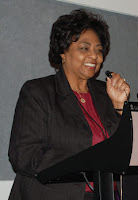FROM TRUE MAJORITY.....
http://act.truemajorityaction.org
The Obama administration just fired a prominent black USDA official after she was smeared by the far-right smear machine at FOX News.1
Shirley Sherrod was in charge of USDA's work in Georgia. And at a recent NAACP dinner she told the story of how she overcame her own racial biases working to help save a white family's farm.
2
But when
FOX News got hold of a selectively edited video that made it appear she was confessing to discriminating against the white couple,
it took less than a day for her to be forced out of her job with the Obama team.
3
We need to
call on the White House to immediately give Shirley Sherrod her job back, and to stop listening to FOX and other right-wing media. Once you've taken action, please tell your friends and family to do the same -- the more people who know the truth about this story, the better.
Just click here to get started:
From start to finish
this whole controversy was manufactured by FOX and its allies to attack an honest woman who's spent her whole life helping poor farmers in Georgia.
First a right-wing blogger posted a deceptively edited video of Sherrod that seems to show her saying that she once didn't "give [a white farmer] the full force of what I could do" to help him, because of his race. Then, FOX News ran the doctored video and false storyline over and over again while their on-air personalities called for Sherrod's firing. Finally,
Sherrod was pressured by the White House to resign without being given a chance to tell her side of the story.5
But the whole thing was a lie. Yesterday, Roger Spooner -- the white farmer in Sherrod's story -- said that Sherrod saved his family's farm and kept them out of bankruptcy. He told
CNN, "I don't know what brought up the racist mess. They just want to stir up some trouble, it sounds to me."
6
This isn't the first time FOX has used a made-up story to attack prominent members of the administration. A few months ago, green jobs czar
Van Jones was forced out in a similar pattern.
7 And several other members of the Obama administration have lost their jobs, been demoted or withdrawn from consideration for jobs after becoming the target of
smear campaigns launched by FOX News.
8
It's bad enough that FOX and the right-wing media use smear campaigns and appeals to racial paranoia to stir up their right-wing viewers. But it's outrageous for Obama to turn his back on honest public servants just to avoid having to fight back.






















